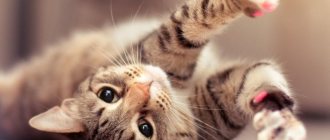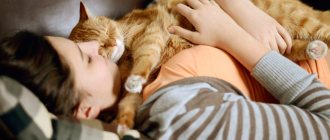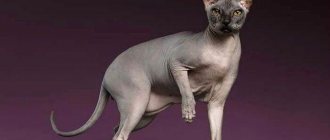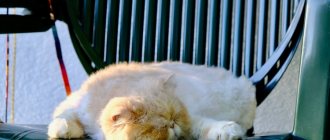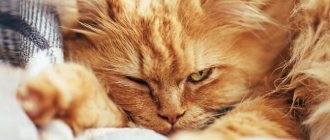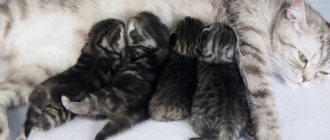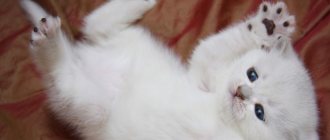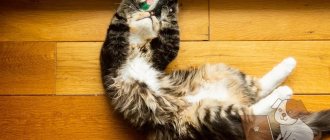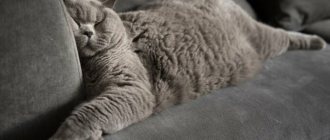5466Pavel
1
Furry pets - cats and cats - spend quite a lot of time sleeping, almost 2/3 of the day. Although this does not mean that their sleep is deep throughout this entire interval, more often it is just a nap. If the cat sleeps on its back, then it certainly sleeps soundly.
You can find out whether a purr is really sleeping by its posture and how it reacts to surrounding stimuli. Usually an animal, like a person, tries to find the body position in which it sleeps as comfortably and sweetly as possible.
It has been noticed that a kitten sleeps in the most relaxed and varied positions, and it sleeps much longer than an adult. At the same time, you should not fear for his life and health; this position on his back does not harm the cat at all.
© shutterstock
Breeding specialists and cat owners tried to deduce a certain pattern why the cat is spinning on its back. We will consider all options.
Trusting relationship
Note that the animal is very sensitive to how the owner treats him. If a cat likes to sleep on his back, then he feels completely safe, he is sure that nothing threatens him. Hiding your tummy, curling up in a ball is an unconscious desire to cover a vulnerable spot. So if you see your cat in this position, know that you are a better owner.
The height of trust is considered to be a kitten sleeping on its back next to its owner. This attitude is worth a lot. Communicate with your pet more, delight with games and treats, and be sure to take care of your health.
Baby pose
Sleeping on the back is associated in cats with the very first impressions in this world and the tender period of infancy:
- Mom's care. Babies end up on their backs as mother licks their tender belly with her tongue, massaging the intestines through the abdominal wall and aiding digestion. Soft and moist stimulation of the natural orifices with the tongue stimulates the emptying of the bladder and intestines, after which the kitten falls asleep contentedly.
- Childhood memory. Cats reliably associate well-fed peace and pleasant warmth with physical posture, and even as adults, they instinctively remember this connection, falling asleep on their backs with a feeling of complete peace. If a kitten climbed onto the bed and, having warmed up, fell asleep next to its owner with its paws up, it means that it associates the person with the mother cat, and the bed with its native lair and safe haven.
Friendly homely atmosphere
Note that in a house where peace and tranquility reigns, where there is no place for scandals and quarrels, even cats feel good and cozy. This is the climate that is favorable for animals. A quiet, measured life makes the kitten calm and balanced, and this is reflected in his sleep. Or rather, in serene poses that one can only be touched by. High-quality nutrition, good care, and complete care are reflected in comfort. The pet feels that nothing can disturb its sweet sleep and therefore relaxes and plunges into it. And the pose on the back is proof of this.
© shutterstock
Forced posture for illnesses
Health problems can cause forced sleep positions as the cat seeks the most comfortable body position to reduce discomfort and pain. The owner should sound the alarm if the unnatural position is accompanied by lethargy of the pet, refusal to eat, problems with natural functions, the presence of lumps in the abdomen, or plaintive meowing.
The reason for this situation may be:
- binge eating;
- bloating and intestinal diseases;
- breathing and heart problems;
- expanded tumors of internal organs and mammary glands.
An animal irritated by an illness may protect the diseased part of the body and respond with dissatisfaction and aggression to an attempt to touch the stomach or palpate it. The owner’s duty is to help a sick friend by urgently taking the animal to a veterinary clinic.
Pet nutrition and overeating
Many kittens like to eat often and a lot; this habit can remain in an adult. They may ask for food constantly, especially when the owners eat something the cat likes. Well, how can you refuse a sweet, kind face and such pleading eyes? And the result is banal overeating. It is after such gastronomic chaos that the cat will go to sleep on his back, with his paws outstretched. In this position, nothing will put pressure on the abdomen.
Although an overeated cat does not always take this pose. A balanced diet, a sufficient amount of vitamins and a diet make the furry beauty sleep healthy and sound. Well, how can you not fall back in a comfortable position in a comfortable place and fall into a sweet sleep? After all, he is sure that upon awakening, he will be able to again receive a portion of tasty and favorite food.
Why does a cat like to lie on its back?
It is no secret that to sleep, animals take the most unrealistic, sometimes hanging, poses and places that are not at all suitable for this matter: radiators, trees, flower pots, the owner’s face.
Table 2. Favorite cat sleeping positions
| Popular name | Body position | |
Incognito style | The pet curled up into a ball, hiding its hind legs and muzzle. Often the ears and tail are flattened | With this pose, cats intuitively protect their vulnerable areas: the throat and stomach. If your pet often curls up in its sleep, this does not mean that it is wary and does not trust anyone, it is just another effective way to keep warm. |
Fetal position | The pet will curl up, tucking one paw. The other three are in a free position | By examining a cat sleeping on its side, you can understand whether it is left-handed or right-handed. This depends on the tucked paw, since it is a pushing one. As a rule, for left-handers, the pushing paw is the right one, and vice versa |
Horizontal version | The pet is spread out at full length, lying on its side | This position is similar to the position of the body on its back, when the animal is as relaxed as possible and immersed in deep sleep. |
Emperor style | The pet lies on its back with its paws stretched up | The most attractive cat sleeping position due to maximum muscle relaxation |
Habit since childhood
The funny pose was imprinted in the memory of predators at that stage of their life when their eyes barely opened. It is known that small kittens spend about 65% of their time in REM sleep. During these few months after birth, they are carefully licked by their mother’s tongue while the kittens bask under her warm fur.
Sleeping on the back is common for both kittens and adults.
These moments of calm and bliss are presumably stored in the pet and manifest as rare (or frequent) episodes in the cat's adult life. Returning to the “roots” allows animals to feel like carefree and happy kittens again.
Confidence
Just like for dogs, for cats, exposing their belly is a sign of friendliness. If a domestic animal is sure that it is absolutely safe, feels protected in a familiar environment with people it knows, then it can allow itself to roll over on its back and even fall asleep like that.
A cat can only allow itself such a vulnerable pose when surrounded by its closest ones.
At the same time, everything can change if new people appear around the pet. A cat, sensing an unfamiliar smell, strives, at a minimum, to protect itself with a more modest pose, wake up, or even run away to another place.
Comfort
When cats bend in a bizarre way and sleep soundly, you should not find a hidden meaning in this, call the doctor or forecast the weather. Basically, for pets, this position simply seems convenient. You shouldn’t deliberately turn them over and make them “the best way.”
Cats do not make unnecessary movements - if they have chosen this position, then it is the most comfortable
Need for affection
It is not difficult to understand what the insidious cat wants when it begins to sway and stretch, touching observers with its flexibility and grace. The animal thus demonstrates its humility and offers to immediately, before it changes its mind, gently and efficiently scratch its belly. For outsiders, displays of such emotions are rare, although in many cases it depends on the animal’s personal attitude towards people.
Sometimes the cat's bizarre pose is addressed to the owner and is a call to play
Attention! In the matter of affection, you should remain careful, since the graceful poses of a cat cannot always be regarded as an invitation to touch the beautiful. The stomach is the weak spot of any animal. For invading a cat's personal space, the punishment may be a blow with a clawed paw or a bite, which is a manifestation of a natural protective instinct. This rule of “mood” applies to absolutely everyone, both our own people and strangers, regardless of whether the cat is tamed or not.
When showing affection, be prepared for the fact that your pet may quickly change his mood
If anyone is interested in why cats roll over on their backs and pull their hands with their hind legs, then the answer is simple: this is inherent in their subconscious by nature itself. Similar behavior can be observed in the wild relatives of domestic cats: they do this to their prey, finishing it off, trying to rip open its stomach. In the case of domesticated pets, these traces of the hunting heritage remain intact.
Heat
Often it is the stuffiness that “falls” kittens onto their backs, forcing them to spread their paws in different directions, because with an open belly the body cools down faster. It is difficult for a person to understand this type of behavior, because at first glance, all cats, with the exception of some breeds, are equally fluffy in all places.
It is customary that the standard indicators of a cat’s body temperature are higher than the human norm. Even during the molting period, the fluffy coat begins to fit more tightly to reduce the air space that traps heat.
Lying on its back, the cat tries to lower its body temperature by airing its undercoat
In the hot summer, cats move to the floor even from the soft, barely occupied master's bed, because on the floor it feels cool. But such measures are not enough for cooling. Heat exchange in the abdominal area occurs faster, since there is less hair there, so cats “ventilate” by turning over on their backs.
Puberty
Discomfort in the groin caused by the desire of an uncastrated cat serves as another answer to the question that interests us. This revealing position helps ease the male's discomfort due to arousal. A person can only wait until the “March” period ends, or find a partner for the pet to mate with.
Binge eating
Tailed lovers of food and sleep have a habit of manipulating people by begging for food. Everything is used, from charisma to undisguised arrogance. Such manipulations sometimes backfire on pets: uncontrollable cat greed and boundless human generosity lead to overeating of the animal.
For overweight cats prone to overeating, sleeping on their back is the only way to rest without squeezing their stomach.
Having had enough, the pet craves only rest. And then he is faced with a problem: curling up into a ball or lying on his paws is painful and uncomfortable. Depending on the degree of overeating, he has to fall on his side or back so that nothing is squeezing his stomach.
Whenever possible, limit your pets from unauthorized access to food.
No matter how funny it may look, the gastronomic issue is not to be joked about. The owner, one way or another, takes responsibility for the one he has fed and tamed, so he must wisely calculate the proportions, making the cat’s diet balanced. If you are having difficulty weaning your pet from trying to eat the owner's food, below are some recommendations for pacifying the gourmet.
We stop the cat from begging for food
Other ailments
For a loving owner, his guests and just random passers-by, a cat resting on its back is a touching sight, a reason to take out a camera for a souvenir photo or to cuddle the animal until it recovers from sleep. Moving on to the planned actions, few people suspect about the health problems of the pet, due to which he selects this particular position.
In addition to behavioral characteristics, various diseases can also be the cause of sleeping on your back.
If sleeping on your back is a sign of illness, it will be accompanied by some of the following signals:
- the pet becomes restless;
- cannot find a place for himself;
- meows often and loudly;
- eats less often;
- cannot go to the toilet or does it too often.
If the cat behaves aggressively during palpation, then it is necessary to identify the source of pain
In this case, a visit to the veterinarian will not be unnecessary. Most likely, your pet may have:
- Digestive tract problems;
- Disease of the genitourinary system;
- Ailments in the groin and other inflammations.
Often, a sick animal does not allow itself to be touched, and when palpation is attempted, even the kindest domestic animal unexpectedly responds with aggression. You can find out more about cat diseases on our portal.
The cause of diseases associated with the inability to lie on the stomach is most often disturbances in the gastrointestinal tract.
If the cat’s tests indicate the absence of pathologies, then the reason for sleeping on the back is one or even several of the above points.
Sometimes, sleeping with their belly up, animals sniffle and even quite literally snore. This is not a symptom of pulmonary or heart failure unless the pet suffers from shortness of breath, poor appetite and inactivity when awake. Otherwise, housewives have nothing to worry about: the nasal septum in an uncomfortable position is slightly depressed, as happens in a person during snoring.
The place or atmosphere in the house is too warm and the cat is too hot
Most cat breeds have thick, dense fur, so they are much hotter than humans. The supine position improves heat transfer. This is especially important in the hot season, when you want to cool down. Then the cats lie on their backs so that the abdomen, on which there is much less hair, is ventilated and the body temperature drops slightly.
© shutterstock
Take care of your belly
The throat and belly are vital parts of the body, and exposing them leaves the animal vulnerable. With decreased vigilance and muscle relaxation, the threat increases, so in the wild, solitary felines are always on the alert.
Their sleep mainly consists of a light doze in a compact position on tucked up paws or, bending over, on their side. From this position you can instantly jump up, like an elastic compressed spring, in order to repel the enemy in time or escape.
Reasons for concern
Lying on your back can also serve as a signal about the development of certain pathologies. These can be diseases of the intestines, kidneys, inflammatory processes in the body. The cat falls on its back, while it does not allow its owners to approach it, does not allow it to be touched (attempts to palpate the stomach will cause attacks of aggression in the animal). There are also additional symptoms:
- lack of appetite;
- stool disorders;
- constant meowing;
- general lethargy or restless behavior.
If such signs are present, urgent consultation with a veterinarian is necessary. A series of tests and treatment may be required.
So, if your pet furry loves to lie on his back and there are no suspicious symptoms, there is no reason to worry. With this pose the animal shows its trust and happiness. Lying on your back is also comfortable in hot weather or after a heavy meal. But you should be wary if the cat is lying on its back, but at the same time lethargic, painful, and apathetic. In such a situation, immediately visit the veterinarian.
